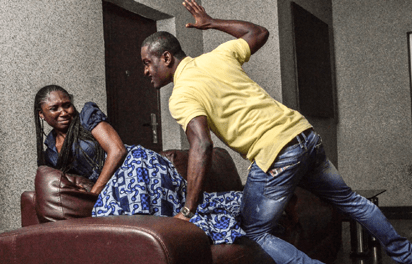
Domestic Violence in Nigeria – Causes, Effects, and Solutions
In this post, we will look at Domestic Violence in Nigeria. Here you will see the causes, effects and possible solutions.
It is a safe bet that you, like the average Nigerian, are completely unaware of the increasing dangers of domestic violence and its effects on the Nigerian society.
👉 Relocate to Canada Today!
Live, Study and Work in Canada. No Payment is Required! Hurry Now click here to Apply >> Immigrate to Canada
A few facts to get your brain going:
#FACT: Any form of maltreatment that takes place in a household is domestic violence.
#FACT: One in three victims of domestic violence is a woman. Statistics back this claim, but what they don’t tell you is that one in three victims is a man. This is also backed by statistics. Go on buddy, Google it.
#FACT: More oft than not, Domestic violence leads to death.
#FACT: Domestic violence is a major public health problem. Nigeria is no exception.
#FACT: Victims are more vulnerable to depression and drug abuse.
Also, I’m almost 110% certain that the first image that comes to mind when you hear the words domestic and violence, is that of a shameless man battering his innocent wife.
👉 Relocate to Canada Today!
Live, Study and Work in Canada. No Payment is Required! Hurry Now click here to Apply >> Immigrate to CanadaAH, poor vulnerable Nigerian women!
Right?
And it just never occurs to anyone that maybe that’s not always the case?
That there’s also such a thing as domestic violence against men in Nigeria?
Listen, women have as much capability to be violent to their male partners.
Since when did the question move from
- “How can we reduce domestic violence in Nigerian homes?” to
- “How can we protect women against domestic violence?”
Did you notice the difference between both questions?
I’m glad you did.
How can we ask the later (2) and not be concerned by the former (1)–which tackles the problem from the root rather than from a one-sided approach?
You must think I’m some kind of misogynist or something.
But my point is, no amount of domestic violence–on any level, is acceptable.
Domestic violence is neither about women nor men, it is about the victim and the perpetrator, and finding long lasting solutions to curb the act of un-penalized violence in Nigerian homes.
While Nigerian women are often reluctant to speak out against their abusers, Nigerian men are even less likely to seek help due to the erroneous belief that it somehow makes them more of a weakling and less of a man –in the eyes of the public.
True or false?
You be the judge.
I have since retired from trying to give answers to rather complicated questions.
How many times have you read or heard of a disheartening story of some domestic violence that caused the death of a promising young man or woman?
How many times have you had to put up with physical violence from your partner?
Before I write anything else, and I don’t mind being redundant, let me quickly state here that domestic violence is as dangerous to men as it is to women.
But here in lies the problem…. many Nigerians are raised to think that…
Domestic Violence is Okay!
And as such most times, would rather stay in an atmosphere where they are vulnerable than walk away and seek long lasting solutions!
Take the women for example; they grow up in a patriarchal society where they are encouraged to remain in violent relationships rather than seek help from active organizations or go to the authorities.
The reason isn’t far-fetched is it?
A woman isn’t considered complete until she bears the “Mrs” title and even then, she loses a lot of “respect” the day she drops that title.
So when a woman complains about domestic violence in her home, she’s often told not to quit the relationship (whether or not it is unbearable for her).
She’s encouraged by parents, relatives and even friends to be strong (and to put it in prayers).
Isn’t it surprising that one Nigerian woman tells another:
“Just manage, ehn? Or you want to be the one that makes your husband go to jail? If you leave the marriage, you’re no longer a married woman. Who will take care of your children? Will you be able to marry again? (as if there’s something wrong with refusing to marry again) and what will people say about you?”
And what about men?
Which Nigerian man wants to go around…..
Telling People That His Wife Abuses Him At Home?
After all, the average Nigerian male is raised with a misguided sense of macho and is seen as the head of the home (whatever that means).
As you might guess, when there’s a serious case of domestic abuse from his partner, he’ll rather tolerate or handle it discreetly than speak up!
It is nearly impossible for the male victim to say
“I’m suffering some serious domestic abuse from my partner, and I need help”
Heck, this misguided sense of macho means most Nigerian men who are suffering one form of domestic abuse or another do not even consider themselves victims.
So while men and women may be equally prone to domestic violence, it is easier for the woman to seek help because she doesn’t have to worry about losing her “man cred”
But that doesn’t justify a man’s inability to speak out.
Research and a recent study from CDC shows that men and women perpetrate violence against each other at roughly the same rates.
Except, there’s more emotional support for Nigerian women than there is for men.
For example, a woman reports a case of domestic violence at the police station and immediately, the officers on duty want to “swing into action” (the most used sentence in the history of the Nigerian police).
But a man does the same and the policeman gives him that amusing frown that says…..
“Have You Gone Mad?”
…“You mean you can’t control your woman?”
And while I agree that the Nigerian society and relevant authorities are often slow to act when it comes to protecting the female victim, the case is worse for the Nigerian man who chooses to speak up.
What causes domestic violence in Nigerian homes?
Anyone who has seen a Nigerian home destroyed by domestic violence would wonder made the perpetrator act that way.
- Mental health problems
- Poverty and unemployment
- Lack of good education (on the ethics of intimate relationships)
- Toxic relationships
- Low self-esteem
- Everyday stress and unpredictable hardships
- Growing up in an abusive family
- Low tolerance and lack of boundaries
- Lack of empathy
- Desire to exercise control
- Lack of trust
Then, what are the effects of domestic violence (or abuse) in Nigeria?
Well, the first thing we need to acknowledge is the fact that domestic violence, on any level, tears families apart.
While the physical injuries, bruises, swollen faces etc are immediately obvious, the long-term effects can be even more devastating for the victim.
There’s something called post-traumatic stress disorder (a psychological/mental health issue), and most times it can be as bad as that for the victim of domestic violence.
That is, even after the victim gets help and walks away from the toxic relationship, h/she still finds it impossible to recover from the horrifying experience of domestic violence suffered in the past.
The college of medicine, University of Ibadan completed a research, the result of which showed more than 1.5 million annual cases of PTSD in Nigeria. Just how many of these are related to domestic violence I’m not sure.
Although it can be treated and resolved, the process can be complicated and isn’t always successful. I guess it just depends on…
How horrifying the victim’s experience was.
And I think the same can be said for other effects of domestic violence; the more horrifying the experience, the more devastating the effects.
You know, as much as I do, that the level of damage done by a bullet from a .45, doesn’t even come remotely close to the disaster caused by a nuclear bomb.
On that note, please consider the following effects of domestic abuse in Nigeria
- Inability to function in daily lives
- Absence from work and probable loss of job
- Anxiety and depression
- Self-harm, suicide attempts
- Alcohol and drug abuse (for lack of a better idea to deal with pain)
- Death
- Suicidal thoughts
- Emotional distress and psychological trauma
- Regular conflicts
- Increase in crime rate
- Changes in eating or sleeping patterns
- Diminished self-image (for the victim)
- Isolation and Poor social skills
- The tendency of the victim to become violent in future relationships
And so on.
You know, the thing about domestic violence is, as a victim, you either convince yourself that you deserve all that abuse, or you just develop a serious disdain for violence, become emotionally tougher, get yourself out of the situation and even go as far as helping others.
Sadly, the former is more common than the later.
Victims of domestic abuse are more likely to tolerate the actions of the abuser (usually their partner) and less likely to stand against it.
Also, in the case of Nigerian children, the unfortunate ones who grow up in violent households and witness domestic abuse over a sustained period of time are sometimes very likely to suffer abuse themselves.
So what?
What are the possible solutions to Domestic violence in Nigeria?
Truth be told, the most difficult part is breaking the cycle of abuse and violence. And for the lack of better words, this requires strength and bloody courage.
Well, I’m not an expert on these things, but I think I should be able to …..
Offer a few reasonable suggestions:
- Seek help immediately (no delays and I’m serious!)
- Consider getting a lawyer
- Stay away from alcohol and drugs (you are more likely to become violent and abusive when your thought process is impaired by addictive substances
- Sensitization (The average Nigerian should be properly informed on how to help a victim of domestic violence).
Most religious institutions can play a significant role in this, except their holy book propagates domestic abuse as a form of discipline or even discourages broken relationships that have nothing to do with infidelity.
Nigeria is a rather excessively religious country and divorcees (domestic violence or infidelity or mutual reasons nobody really cares about your reasons) are regarded with contempt.
Can you comprehend that?
- Strict penalties.
- Swift and effective law enforcement measures
- Consider counseling (Although this field doesn’t really thrive in Nigeria, it has been shown to help). Both the abuser and victim can experience positive changes by seeking a therapist who specializes in treating domestic violence related cases.
- Stop blaming the victim.
- The Nigerian government could run regular Nationwide TV campaigns on the dangers of domestic violence and the strict penalties that await the abuser.
- Crisis centers and support groups that help the victim recover smoothly. Sometimes counseling and strict penalties are not enough. Even after the domestic violence has stopped, the victim could always use as much psychological and social support as possible.
Maybe there’s more.
Maybe not.
But it shouldn’t be all talk and no action.
If you find a victim of domestic violence, do what you can to help.
Also, you might have noticed –in the course of reading this, that the tone of this message is not overly enthusiastic as with my other articles, and that’s because this topic is very sensitive to me.
It’s nothing to worry about.
More later.
Peace.







